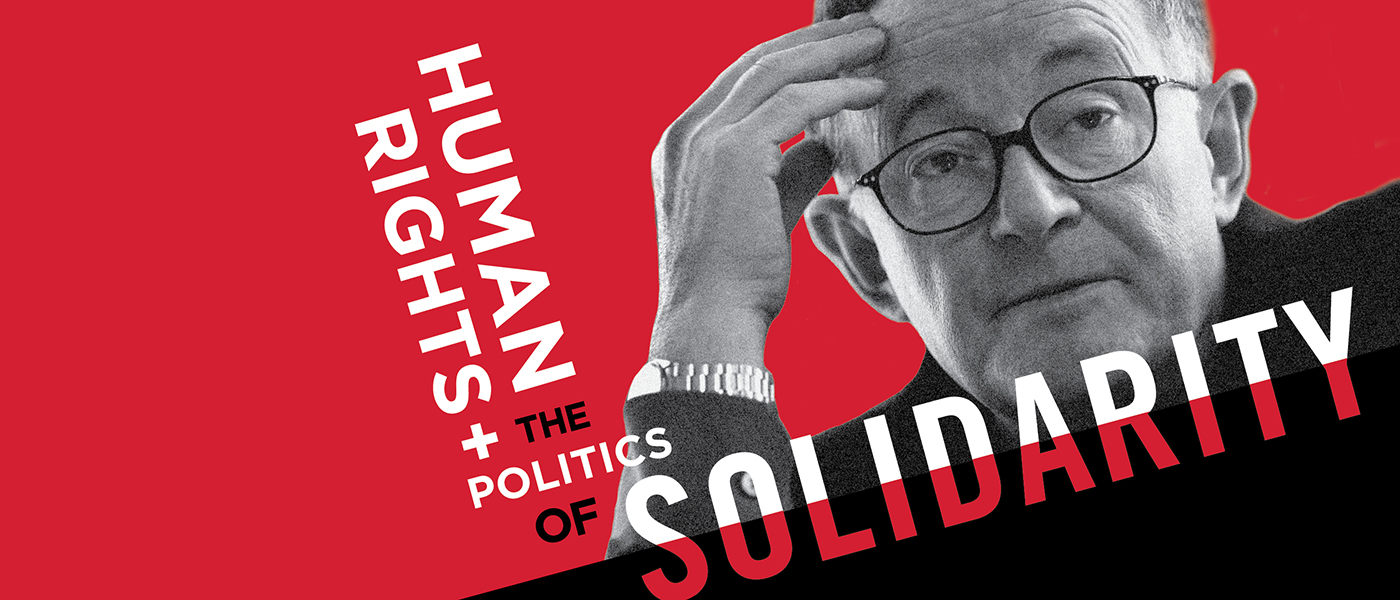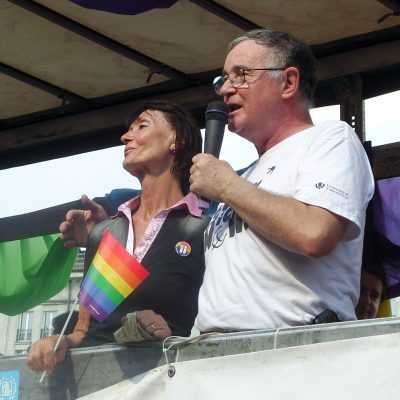A Conference in Honor of Wiktor Osiatyński
April 4-5, 2019 • Storrs, CT


Wiktor Osiatynski and Ewa Woydyllo
The commitment to solidarity in human rights practice is under attack from both external and internal threats. Externally, rising populism, nativism, and xenophobia pose significant challenges for human rights advocates seeking to make the case for universal rights. Internally, as well, human rights faces significant disillusionment and critique. And the means and methods of human rights—mobilizing shame, finding facts, seeking prosecution—appear increasingly ineffectual. Governments are shameless, the international criminal law project is feared to be failing, and even “truth” is under siege.
Drawing inspiration from the work of the late Polish scholar and human rights advocate, Wiktor Osiatyński, this conference seeks to reclaim solidarity as an affirmative agenda for responding to these external and internal threats. Osiatyński played an instrumental role in fostering civil and political rights mobilization and the democratic transition of many states in Central and Eastern Europe. His work in the Helsinki Foundation for Human Rights and as a board member of the Open Society Foundations had a profound impact on programs ranging from the rule of law and constitutional development to gender-based violence and health and substance use.
In celebration of the 15th anniversary of the Human Rights Institute, this conference will consider the history and origins of human rights and the ability of the movement to meet future challenges. Osiatyński worked closely with faculty and students at the University of Connecticut to help build the Human Rights Institute into one of the leading interdisciplinary programs on human rights. Towards the end of his life, Osiatyński reflected with the Institute on the meaning of Trump’s election, Brexit, inequality, and the rise of illiberal politics. Osiatyński called for human rights advocates and scholars to challenge the ascent of nationalism and fear, urging the use of new methods and means of human rights work to protect the rights of all.
Taking inspiration from Osiatyński’s words, this conference will consider the meaning of solidarity and its role in creating an affirmative agenda for responding to the challenges facing the human rights movement in the 21st century. The conference will begin with a high level discussion of current threats to solidarity in human rights work, followed by panels designed to consider these issues in historical perspective as well as addressing the particular challenges in areas such as international criminal law and economic justice.
Conference Outline
Thursday, April 4, 2019
All panels on April 4th will take place at the Thomas J. Dodd Research Center.
9:00am-9:45am – Welcome and Opening
Recognition of Wiktor Osiatyński’s work and legacy.
10:00am-11:15am – Opening Keynote Panel: Solidarity and Human Rights
Human rights is under siege. Externally, rising populism, nativism, and xenophobia pose significant challenges for those making the case for universal rights. Political leaders are transforming human rights into a zero-sum game, with guarantees of rights for “others”—whether refugees, prisoners, or minorities—increasingly perceived as threats to one’s own rights. Internally, as well, the human rights movement is facing significant disillusionment and critique. Charges of its failures—its elitism, its neglect of economic inequality, its essentially political nature—seem louder than ever. This panel will consider these threats and ask what role solidarity might play in responding.
Panelists
- Adam Bodnar, Human Rights Ombudsman for Poland
- Harsh Mander, Centre for Equity Studies
- César Rodríguez-Garavito, Center for Law, Justice and Society (Dejusticia)
- Kathryn Sikkink, Harvard University
Moderator: Kathryn Libal, University of Connecticut
11:30am-12:45pm – The Foundations of Human Rights: Law and Constitutions
Human rights is a unique kind of social justice language, one founded on legal norms that enable individuals to make claims based not only on the morality of their demands but also their legal command. At the same time, these legal claims are often unenforceable. This panel will consider the role of law and constitutions in promoting and protecting rights. Does law matter? Is the legal foundation of human rights a strength or weakness? What is the role of courts and constitutions in pushing back against rising illiberalism and authoritarianism in nations around the world? Is human rights better understood as a political discourse rather than a legal one? Can human rights law promote solidarity, even across borders? Do we need to go beyond rights-based legal claims to pursue social justice goals?
Panelists
- Phillip Ayoub, Occidental College
- David Landau, Florida State University
- Wayne Sandholtz, University of Southern California
- Małgorzata Szuleka, Helsinki Foundation for Human Rights
Moderator: Molly Land, University of Connecticut
1:00pm-1:45pm – Lunch
2:00pm-2:30pm – Keynote Address
Aryeh Neier, President Emeritus, Open Society Foundations
2:30pm-3:45pm -Transitional Justice and Accountability After Mass Crimes
Transitional justice institutions emerged in Latin America in the 1980s as a response to widespread impunity and the perceived inadequacies of the criminal justice system. Some human rights defenders, however, continued to pursue criminal liability for perpetrators through domestic trials and new international criminal tribunals that were established in the 1990s and thereafter. For a time, the divergence in opinion on the central priorities of transitional justice institutions widened, but the debate between “reconcilers” and “retributivists” has moderated somewhat, and today there is more recognition of how institutions with different agendas might complement and coordinate with one another. At the same time, however, the universalist vision of criminal justice has faltered, as the legitimacy of the international criminal court has been challenged by inadequate resources and state defection. This panel will review the state of the field and advance a vision of how a holistic field of transitional justice might be achieved that integrates the various approaches to the central objectives of transitional justice-truth-finding, mediation, reparations and accountability and seeks to understand the respective roles of international and national institutions.
Panelists
- Rachel Lopez, Drexel University
- Jamie Rowen, University of Massachusetts, Amherst
- Matiangai Sirleaf, University of Pittsburgh
- Kimberly Theidon, Tufts University
Moderator: Richard A. Wilson, University of Connecticut
4:00pm-4:30pm – 21st Century Human Rights Work: A View from Helsinki Foundation for Human Rights
With Maciej Nowicki and Małgorzata Szuleka from the Helsinki Foundation for Human Rights.
Friday, April 5, 2019
9:00am-10:45am – Economic and Social Rights: Grappling with Inequality
Location: Konover Auditorium, Thomas J. Dodd Research Center
Inequality has emerged as a flashpoint in debates on the relevance of human rights in a context of heightened populism, nativism, and authoritarianism in the 21st Century. Philip Alston recently called for the human rights community to address “the extent to which extreme inequality undermines human rights.” This panel will explore the relationship between rising levels of inequality and anti-globalization currents, and, by extension nativist backlash. How do human rights methods and tools address increased levels of inequality a national and global levels? What are human rights approaches to government spending and taxation? Is it possible to revitalize movements to advance economic and social rights in the face of austerity? How should human rights grapple with economic crises?
Panelists
- Varun Gauri, World Bank
- Tara Melish, State University of New York, Buffalo
- Istvan Rev, Central European University
- Ignacio Saiz, Center for Economic and Social Rights
- Katherine Young, Boston College
Moderator: Shareen Hertel, University of Connecticut Moderator:
11:00am-12:30pm – New Modes of Mobilization for Human Rights
Location: Konover Auditorium, Thomas J. Dodd Research Center
The traditional means and methods of human rights—mobilizing shame, finding facts, seeking prosecution—appear increasingly ineffectual in responding to modern human rights problems. Governments are shameless and “truth” seems irrelevant or non-existent. How is human rights advocacy evolving, and responding to new challenges? Should human rights change its tactics? Are those mobilizing for human rights at national and transnational levels equipped to meet challenges? This panel will explore examples of human rights advocacy and research that are uniquely well placed to meet current challenges.
Panelists
- Gerardo Reyes Chávez, Coalition of Immokalee Workers
- Kasia Malinowska, Open Society Foundations
- Rashida Manjoo, University of Cape Town
- Margaret Satterthwaite, New York University
- Jessica Wyndham, American Association for the Advancement of Sciences
Moderator: Glenn Mitoma, University of Connecticut
1:00pm-3:00pm: Lunchtime Breakout Sessions – Methodological Innovations on Human Rights
Location: Rome Commons Ballroom
This is an interactive session allowing conference participants to choose a breakout session on methodological innovations in human rights mobilization. Human rights practitioners will give brief presentations, followed by a guided discussion with attendees.
Session Topics/Presenters
Mobilizing the World to End Violence Against Women: The Campaign for an International Treaty
This session offers a window into the growing movement for a stand-alone, legally-binding international treaty addressing violence against women and girls. Presenters from the global NGO “Everywoman Treaty” will discuss the movement’s origins, their group’s strategy and tactics, and the political and mobilization-related challenges ahead.
- Charlie Clements, Everywoman Treaty
- Lola Ibrahim, Everywoman Treaty
- Moderator: David Richards, University of Connecticut
The Human Rights Measurement Initiative
This session introduces the Human Rights Measurement Initiative (HRMI), a global collaborative project that is focused on providing human rights data useful to practitioners, researchers, journalists, and everyday people worldwide. HRMI uses a co-design process tapping the insights and needs of human rights advocates, practitioners, and researchers across disciplines and professions to produce human rights data rigorously grounded in international law and present it in a way that is readily usable and understandable for academics, policy makers, journalists, advocates on the front line and ordinary people alike.
- Susan Randolph, University of Connecticut
Enhancing Human Rights Through Mediation and Peaceful Dispute Resolution
This session will address the interrelationship of human rights, rule of law and peaceful dispute resolution. The presenter, founder of an NGO dedicated to promoting mediation and ADR worldwide, will discuss the strategies (and some of his “eye opening”experiences) to provide access by underserved populations to timely, fair and effective justice in heavily backlogged court systems.
- Vic Schachter, Foundation for Sustainable Rule of Law Initiatives
Protecting Scholars at Risk and Academic Freedom
This session introduces the protection work of Scholars at Risk (SAR), which is an independent not-for-profit hosted at New York University and global network of universities supporting scholars targeted for their work. A total of 294 attacks on higher education communities in 47 countries were reported by SAR from September 1, 2017, to August 31, 2018. As attacks on the higher education community, scholars, and academic freedom grow in number, we will discuss ways in which universities and individuals can mobilize and get involved with SAR’s work to promote academic freedom and protect scholars facing risk.
- Shreya Balhara, Scholars at Risk
Genocide Prevention in the 21st Century
Twenty-five years after the Rwandan genocide mass atrocities continue to occur around the world. Can we ever successfully prevent atrocities? In this breakout, we will discuss contemporary efforts aimed at making atrocities prevention a reality as well as how you can get involved in advocating for legislation that would improve the US government’s ability to prevent atrocities.
- Mike Brand, Human rights/atrocities prevention advocate
4:00pm – Performance and Closing Address
Location: Thomas J. Dodd Research Center
Musical performance and closing keynote talk by Mai Khoi.
Reception